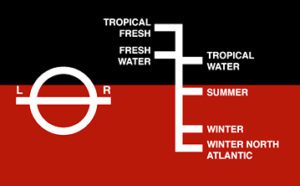Britain has a rich shipping heritage and it’s nice to think we have made a considerable contribution to modern shipping standards.
As the new year 2015 started, by coincidence, news came through of two nautical emergencies off the coast of the UK. At the time of writing this blog, both these incidents were being managed by the authorities.
However, the impact these news stories have made is perhaps an indication that shipping and particularly the busy channels around the UK are relatively safe, with the industry striving to improve standards.
One of the most significant developments in my opinion, was invented by Samuel Plimsoll in the 1870s.
Plimsoll was a British MP who is best remembered for devising the Plimsoll Line – a marking applied to a ship’s hull to show the maximum safe loading.
Load Lines and the Plimsoll Line
The idea of Load Lines on ships was not new. It is thought that the Kingdom of Crete enforced loading regulations as far back as 2,500 BC and as recent as 1835 recommendations were introduced by Lloyd’s Register of British and Foreign Ships.
However, the 1860s saw an increase of ships lost because of overloading and this prompted action.
Plimsoll tried, unsuccessful at first, to pass a bill relating to safe loading lines on ships. It is thought opposition was largely from ship owning MPs of the time.
In 1873, following a motion by Plimsoll, a Royal Commission was appointed and in 1876 the Merchant Shipping Act made the load line mark compulsory, although the positioning of the line was not fixed until 1894.
What is the Mark?
The original Plimsoll line was a circle with a horizontal line crossed through to show the safe loading.
Over the years more information has been added to the load lines including different water densities and expected sea conditions.
Improved Standards
By 1930 an international agreement had been reached, standardising the markings around the world.
There’s no doubt that the use of loading lines supported by enforcement of safe loading legislation has made shipping safer and demonstrates the continuing efforts to reduce risk in many industries.
While the two incidents at the start of 2015 are unfortunate and in one case tragic, I’m confident that they will be investigated and any lessons learnt.
Sources:
Blog by By Robert Clements. Further reading:
http://www.bbc.co.uk/news/uk-england-hampshire-30670746
http://www.bbc.co.uk/news/uk-scotland-h … s-30667084
http://en.wikipedia.org/wiki/Waterline


